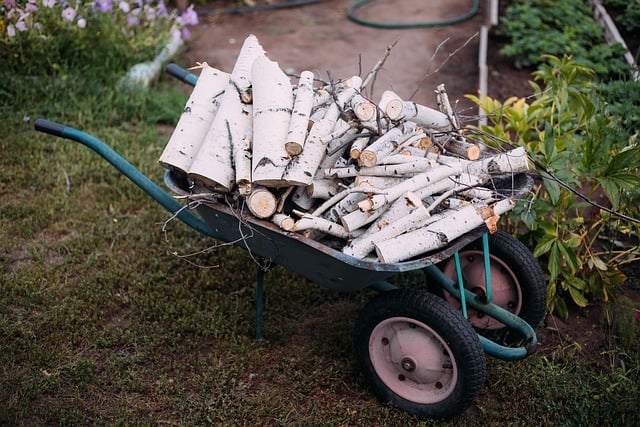The text emphasizes the environmental impact of improper yard waste management, particularly methane emissions from landfills. It promotes sustainable alternatives like composting and recycling, which reduce waste, enhance soil health, and combat climate change. Effective strategies include separate collection for recyclables, repurposing debris as mulch, and innovative disposal methods. Community engagement, through clean-up events and knowledge sharing, drives these practices, leading to reduced landfill waste and a smaller carbon footprint. Yard Waste Removal and Recycling is key to fostering environmental stewardship and sustainable yard maintenance.
In today’s eco-conscious world, responsible yard maintenance is more important than ever. This practice directly impacts our environment, with yard waste contributing significantly to landfill congestion and greenhouse gas emissions. However, by adopting sustainable practices such as comprehensive recycling and eco-friendly landscaping, we can mitigate these effects. This article explores effective strategies for Yard Waste Removal and Recycling, while also emphasizing the role of community engagement in fostering long-term sustainability in yard maintenance efforts.
- Understanding Yard Waste Impact and Sustainable Alternatives
- Effective Strategies for Yard Waste Removal and Recycling
- Community Engagement and Long-Term Sustainability in Yard Maintenance
Understanding Yard Waste Impact and Sustainable Alternatives

Understanding Yard Waste Impact and Sustainable Alternatives
Yard waste, from grass clippings to leaf debris, can significantly contribute to environmental issues if not managed properly. Traditional methods of yard waste removal often involve sending this organic material to landfills, where it decomposes slowly, releasing methane gas—a potent greenhouse compound that exacerbates climate change. This is a pressing concern in today’s digital era, where folks are increasingly conscious of their carbon footprint.
However, sustainable alternatives like yard waste recycling offer a promising solution. By composting or recycling these materials, we can reduce the amount of waste sent to landfills, enhance soil fertility, and conserve natural resources. Yard waste removal and recycling not only help mitigate climate change but also foster a healthier, more vibrant landscape. This approach encourages a harmonious relationship between our outdoor spaces and the environment, ensuring a more sustainable future for all.
Effective Strategies for Yard Waste Removal and Recycling

Effective strategies for yard waste removal and recycling are essential components of sustainable yard maintenance. One key approach is composting, which turns organic materials like leaves, grass clippings, and food scraps into nutrient-rich soil amendments. Homeowners can create their own compost piles or utilize municipal composting programs to divert waste from landfills. Another strategy involves repurposing yard debris as mulch, which not only reduces the need for synthetic fertilizers but also helps retain moisture in the soil and suppress weeds.
Proper disposal is equally important. Many communities offer separate collection services for recyclable materials such as paper, plastic, glass, and metal. Additionally, yard waste can be chipped into small pieces using specialized equipment or shredded to create biodegradable bags. These practices not only minimize landfill contributions but also support a circular economy by transforming waste into valuable resources. By adopting these effective strategies for yard waste removal and recycling, individuals contribute to environmental preservation while enhancing the health and aesthetics of their yards.
Community Engagement and Long-Term Sustainability in Yard Maintenance

Community engagement plays a pivotal role in fostering long-term sustainability for yard maintenance practices. Encouraging local residents to participate actively in managing their green spaces can lead to significant environmental benefits. This involvement may include organizing community clean-up events where neighbors collaborate to remove unwanted vegetation, debris, and yard waste. By implementing proper techniques for Yard Waste Removal and Recycling, communities can divert a substantial amount of material from landfills, reducing the carbon footprint associated with traditional waste management methods.
Moreover, engaging the community allows for knowledge sharing and the adoption of sustainable practices. Educating residents about composting, native gardening, and water conservation techniques empowers them to make eco-friendly choices in their daily routines. These collective efforts create a culture of environmental stewardship, ensuring that yard maintenance remains a sustainable practice for generations to come.
Sustainable yard maintenance is not just a trend, but a necessary practice to protect our environment. By understanding the impact of yard waste and adopting effective removal and recycling strategies, we can significantly reduce our ecological footprint. Furthermore, fostering community engagement ensures long-term sustainability, as collective efforts lead to healthier landscapes and a greener future for all. Let’s continue to explore and implement these practices, making our yards more eco-friendly and beautiful.

